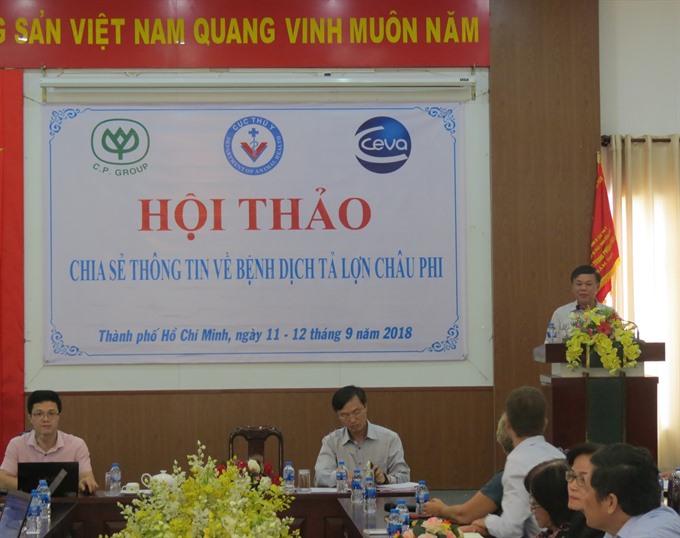 Society
Society

Việt Nam is under risk of an African Swine Flu outbreak, prompting careful monitoring of pig farms for signs of infection and prevention of smuggling of untested pork, said experts at a conference on the disease held in HCM City on Tuesday.
 |
| A conference on African Swine Flu held in HCM City on Tuesday featured experts who recommended strict regulations on monitoring, transportation and biosafety to prevent the disease from entering Việt Nam. – VNA/VNS Photo Việt Dũng |
HCM CITY – Việt Nam is under risk of an African Swine Flu outbreak, prompting careful monitoring of pig farms for signs of infection and prevention of smuggling of untested pork, said experts at a conference on the disease held in HCM City on Tuesday.
African Swine Flu (ASF) is a type of infectious hemorrhagic fever which has a 90 – 100 per cent mortality rate for pigs and there is no vaccine or cure, according to Dr Mateo del Pozo of Spain’s National Institute for Agricultural and Food Research and Technology.
Although the disease is not dangerous to humans, it can cause great economic loss for farmers and harm pork trading.
From the end of 2017 to September 10, 17 countries and regions in Europe and Asia such as China and Estonia have had ASF outbreaks, with over 560,000 pigs culled, according to the World Organisation for Animal Health.
From the start of August to September 10, China reported 14 outbreaks, with 38,000 pigs culled. The disease is moving southward towards provinces near Việt Nam.
ASF is spread from pig to pig through various ways, including animal feed contaminated with the pathogen, carriers such as ticks, or direct contact between infected pigs and healthy ones.
The incubation period is around four to 19 days, with symptoms including high fever, loss of appetite and hemorrhage. Sometimes pigs can die even before clinical signs appear.
The structurally complicated ASF virus is very resilient and can persist in undercooked pork products or corpses, but they can be killed when exposed to 56oC for 70 minutes or 60oC for 20 minutes, or with traditional sterilisation substances.
Đàm Xuân Thành, deputy head of the Department of Animal Health under the Ministry of Agriculture and Rural Development, said the disease is mostly transferred via human actions.
The virus does not spread as quickly as classical swine fever or foot-and-mouth disease viruses.
The trading of pork of unclear origin and transportation of untested pigs or pork products (via smuggling or gifts) can carry the disease from one country to another, such as the case where a Korean airport detected the ASF virus in food brought over from China, he added.
Nguyễn Văn Long, head of the Epidemiology Department of the Department of Animal Health, said the only way to detect the disease is through testing samples from pigs.
Authorities have been instructed to strictly monitor pig farms for signs of infection, while pig farms can apply strict bio-safety regulations for farms, with frequent sterilization for farming equipment, barns and farmers.
Transportation and importation of pork must also be carefully monitored, while pork products with unclear origin must not enter Việt Nam.
If there are signs of ASF, health authorities should be notified immediately so they can quarantine pigs and ban transport of pork out of the immediate region, and cull infected pigs and others within a certain distance, Long said
Farmers with culled pigs would be supported financially. Pigs that may be affected by the virus should be culled, and officials should also not attempt to cure infected pigs, as the pathogen may spread from one official to other pigs.
“Farmers and consumers should be aware of the danger of the virus. Farmers should follow biosafety regulations and avoid smuggling pigs, while travelers should only buy pork products that are properly tested,” Thành of the Department of Animal Health said.
The conference was organised by the Department of Animal Health; Ceva Santé Animale in HCM City, a French-based animal vaccine and drug company; and C.P. Việt Nam, a Thai-based conglomerate that focuses on agriculture, food, retail and distribution. – VNS




